But I'm a Cheerleader (1999): satire against stereotypes | una sátira contra los estereotipos

Una comedia romántica clásica de los '90 con un toque diferente
We currently live in the era of cancel culture: almost nothing can be said. Or rather, you can say it, but almost anything you say will be criticized and condemned by a sector of the population and that has affected not only personal relationships but above all the art of telling stories. Most books, movies and television series are increasingly inclusive, politically correct, careful with stereotypes and afraid to make certain jokes or touch on certain topics for fear of being canceled or crucified by public opinion.
Actualmente vivimos en la época de la cultura de la cancelación: no se puede decir casi nada. O mejor dicho, se puede decir, pero casi cualquier cosa que se diga será criticada y condenada por un sector de la población y eso ha afectado no sólo las relaciones personales sino sobre todo el arte de contar historias. La mayoría de los libros, películas y series de televisión son cada vez más inclusivas, políticamente correctas, cuidadosas con los estereotipos y temen hacer ciertos chistes o tocar ciertos temas por miedo a ser cancelados o crucificados por la opinión pública.
But about twenty years ago it wasn't like that. One thing that has surprised me in recent months is seeing people of fifteen or twenty years old use a lot of references, memes, songs and scenes from the nineties. At the close of the last millennium, pop culture in music, film and television went to places that some today wouldn't dare to go and that is why there are many who enjoy bringing back the irreverence, freshness and absurdity of some of those years stories in which perhaps certain topics that were barely taboo were not talked about so openly, but through humor they proposed rethinking certain important things. Some of that is what is seen in the fun But I'm a Cheerleader by Jamie Babbit, a film that tells the story of a teenager named Megan, a cheerleader at her high school who, although she's blonde, her personality is far from the anthological cheerleader of the other films. It cannot be said that she's the queen of the school and although she's well-known, she's not popular. Megan is not the cool cheerleader who does incredible routines and embodies the fantasy of the school kids, so this story is nothing like the remembered Bring it On or the mediocre Fired Up! Megan is a cheerleader, yes, but she's weird. So weird that some of her cheerleader friends, her boyfriend (captain of the football team) and her parents decide to join forces to help her, but help her with what? What is the problem that Megan has that makes all these people want her to change, to be cured?
Pero hace unos veinte años no era así. Una cosa que me ha sorprendido en los últimos meses en ver a personas de quince o veinte años utilizar una gran cantidad de referencias, memes, canciones y escenas de los años noventa. Al cierre del milenio pasado, la cultura pop en música, cine y televisión, fue a lugares a los que algunos hoy no se atreverían a ir y por eso son muchos los que disfrutan trayendo de vuelta la irreverencia, frescura y el absurdo de algunas historias de aquellos años en los que quizás no se hablaba tan abiertamente de ciertos temas que apenas dejaban de ser tabú, pero que a través del humor propusieron replantearse ciertas cosas importantes. Algo de eso es lo que se ve en la divertida But I'm a Cheerleader de Jamie Babbit, película que cuenta la historia de una adolescente llamada Megan, porrista en su secundaria que, aunque es rubia, su personalidad está lejos de la cheerleader antológica de las demás películas. No se puede decir que sea la reina del colegio y aunque es conocida no es popular. Megan no es la porrista cool que hace rutinas increíbles y encarna la fantasía de los chicos del colegio, así que esta historia no es nada al estilo de la recordada Bring it On o la mediocre Fired Up! Megan es porrista, sí, pero es rara. Tan rara que algunas de sus amigas animadoras, su novio (capitán del equipo de fútbol americano) y sus padres, deciden unir fuerzas para ayudarla, pero ¿ayudarla en qué? ¿cuál es el problema que tiene Megan y que hace que todas estas personas quieran que cambie, que se cure?
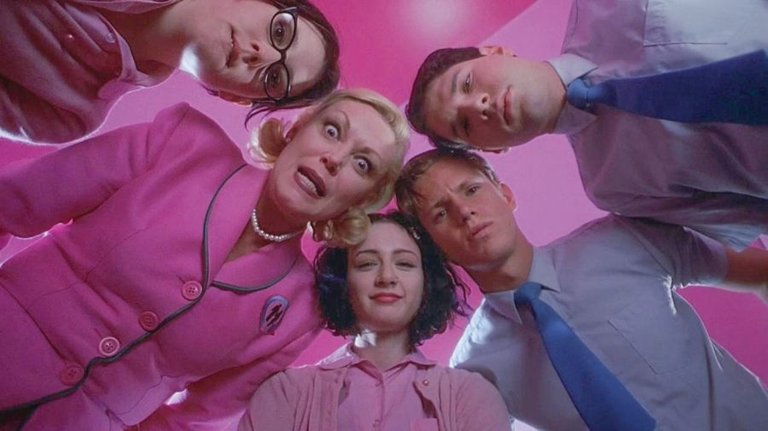
The girl is a vegetarian, she doesn't really enjoy kissing her boyfriend (who is not a good kisser, by the way), she's affectionate with her girl friends and in her room she doesn't have posters of boys but of women she admires; and all those things are, for her close circle, irrefutable and indisputable proof that Megan is a lesbian. As it's about a girl who grows up in the middle of a conservative family in the nineties, the solution is to cure the girl and for that they send her to Straight Camp, a place where she will be interned for a couple of months during which she will be subjected to various tests until the local leaders manage to cure her homosexuality.
La chica es vegetariana, no disfruta mucho besar a su novio (que no es un buen besador, por cierto), es cariñosa con sus amigas y en su habitación no tiene posters de chicos sino de mujeres a las que admira; y todas esas cosas son, para su círculo cercano, pruebas irrefutables e indiscutibles de que Megan es lesbiana. Como se trata de una chica que crece en medio de una familia conservadora en los años noventa, la solución es curar a la chica y para eso la envían a Straight Camp, un campamento en donde estará internada un par de meses durante los cuales será sometida a diversas pruebas hasta que los dirigentes del lugar logren curar su homosexualidad.
The plot is funny not only because of Megan's personality, one of the sweetest and most innocent cheerleaders I've ever seen on screen, but also because of the exaggeration of certain stereotypes that are exploited to the max in the film. Starting from the typical colors the campers wear (blue for the boys and pink for the girls) to the behavioral reinforcements they are subjected to (boys: chopping firewood; girls: housecleaning) through the hypocrisy of the institution (the one in charge of straightening the boys is none other than RuPaul, before drag) and the naive yet ineffective central idea of bringing together young homosexuals and making them live together for months and sleep together to cure them from their homosexuality. Needless to say, in most cases, the camp instructors fail and all the behavioral reinforcement tests provide hilarious moments in the film. The first of these, not to give too much away, occurs near the beginning of the film. When Megan's parents tell her that they think she's a lesbian and want to help her, the girl is surprised, not because of her parents' good will but because she's sure she's normal, i.e. straight girl. Good girl and obedient, she goes to the camp convinced that it's a mistake and that there's nothing wrong with her, that she's a vegetarian and a little weird, but she likes boys. She has a boyfriend, so how can she be a lesbian? Well, it turns out that the camp she's sent to in order to be cured of a homosexuality she doesn't recognize is precisely the place where she realizes that others are right: she likes women, isn't it tremendously ironic and funny?
La trama resulta graciosa no sólo por la personalidad de Megan, una de las porristas más dulces e inocentes que he visto en pantalla, sino por lo exagerado de ciertos estereotipos que son explotados a más no poder en la cinta. Partiendo de los típicos colores que visten los internos en el campamento (azul para los chicos y rosa para las chicas) hasta los reforzamientos conductuales a que son sometidos (ellos: cortar leña; ellas: limpieza del hogar) pasando por la hipocresía de la institución (el encargado de enderezar a los chicos es nada más y nada menos que RuPaul, antes del drag) y la ingenua y a la vez ineficaz idea central de juntar a jóvenes homosexuales y hacerlos convivir durante meses y dormir juntos para curarlos de su homosexualidad. Sobra decir que en la mayoría de los casos, los instructores del campamento fracasan y que todas las pruebas de reforzamiento conductual brindan momentos hilarantes en la película. El primero de ellos, para no revelar mucho, ocurre casi al inicio de la película. Cuando los padres de Megan le dicen que creen que es lesbiana y que la quieren ayudar, la chica se sorprende, no por la buena voluntad de sus padres sino porque ella está segura de ser una chica normal, es decir heterosexual. Buena chica y obediente, va al campamento convencida de que se trata de un error y de que ella no tiene nada malo, que sí es vegetariana y algo rara, pero le gustan los chicos. Tiene novio, incluso, ¿cómo puede ser lesbiana? Bueno, resulta que en el campamento al que es enviada para curarse de una homosexualidad que ella no reconoce es precisamente el lugar en el que se da cuenta de que los demás tienen razón: le gustan las mujeres, ¿no es tremendamente irónico y divertido?
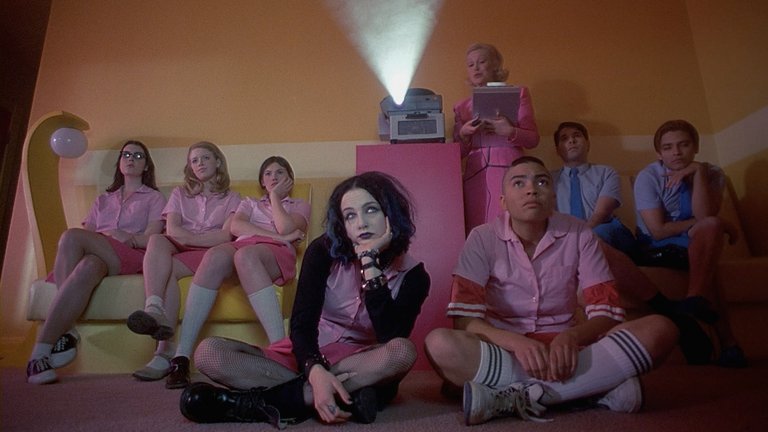
The plot is not complicated and presents no unpredictable twists. To a large extent, the core of the story is that of a period romantic comedy with flirtations, romances, threats of a breakup and a happy ending, but it's fun in its lightness and dynamic in its progress. It's not a film that is boring and it makes good use of absurdist humor. I can't know what it would have been like to watch it back in 1999, but now, twenty-five years later, I think it's a fun and thoughtful exercise to see how far we've come in terms of gender diversity and respect for people's sexual identity.
La trama no es complicada y no presenta giros que resulten impredecibles. En buena medida, el núcleo de la historia es el de una comedia romántica de la época con flechazos, romances, amenazas de ruptura y un final feliz, pero es divertida en su ligereza y dinámica en su avance. No es una película que resulte aburrida y hace buen uso del humor absurdo. No puedo saber cómo habría sido verla en 1999, pero ahora, veinticinco años después, creo que resulta un ejercicio divertido y reflexivo ver cuánto hemos avanzado en términos de diversidad de géneros y en el respeto por la identidad sexual de las personas.
A very pop aesthetic, with various shades of pinks, blues, greens and yellows, jokes and mockery of various taboos, condemnation of the heteronormative through its own defense, exposure of the ridiculousness of stereotypes and how old it is to talk about women's stuff and men's stuff as if they were two different species, the mix of innocence, naiveté, guilt and self-analysis, a cast that includes Natasha Lyonne (from Orange Is the New Black), Clea DuVall (who has been in films like Argo, 21 grams and Zodiac), Melanie Lynskey (remember Uncle Charlie's neighbor on Two And a Half Men? well, that's her) to Michelle Williams herself (Dawson's Creek, Manchester By the Sea, My Week With Marilyn) and a brief appearance by Julie Delpy (Celine in Before Sunrise), all this makes But I'm a Cheerleader a gem of independent cinema that became a cult film thanks to the direction of Jamie Babbit (who counts in her palmarés having directed some episodes in such iconic series as Gilmore Girls, Malcolm in the Middle, Nip/Tuck and Pretty Little Liars). But I'm a Cheerleader is a satire that is not only hilarious but also thoughtful in its parody and that I think would make a good duo with Alice Wu's Saving Face when it comes to reviewing how romantic relationships between women were viewed twenty years ago, before we got to The Handmaiden or Portrait of a Lady on Fire, have any of you seen this movie? what did you think? I'll read you in the comments.
Una estética muy pop, con diversos tonos rosas, azules, verdes y amarillos, chistes y burlas sobre diversos tabúes, la condena de lo heteronormativo a través de su propia defensa, la exposición de lo ridículo que resultan los estereotipos y lo antiguo que es hablar de cosas de mujeres y cosas de hombres como si se tratase de dos especies distintas, la mezcla de inocencia, ingenuidad, culpa y auto análisis, un elenco que incluye a Natasha Lyonne (de Orange Is the New Black), a Clea DuVall (que ha participado en películas como Argo, 21 grams y Zodiac), Melanie Lynskey (¿recuerdan a la vecina del tío Charlie en Two And a Half Men? bueno, es ella) a la mismísima Michelle Williams (Dawson's Creek, Manchester By the Sea, My Week With Marilyn) y una breve aparición de Julie Delpy (Céline en Before Sunrise), todo ello hace de But I'm a Cheerleader una joya del cine independiente que se convirtió en película de culto gracias a la dirección de Jamie Babbit (que cuenta en su palmarés el haber dirigido algunos episodios en series tan icónicas como Gilmore Girls, Malcolm in the Middle, Nip/Tuck y Pretty Little Liars). But I'm a Cheerleader es una sátira que resulta no sólo hilarante sino también reflexiva en su parodia y que creo que haría una buena dupla con Saving Face de Alice Wu a la hora de revisar cómo eran vistas las relaciones románticas entre mujeres hace veinte años, antes de que llegáramos a The Handmaiden o Portrait of a Lady on Fire, ¿alguno de ustedes ha visto esta película? ¿qué les pareció? Los leo en los comentarios.
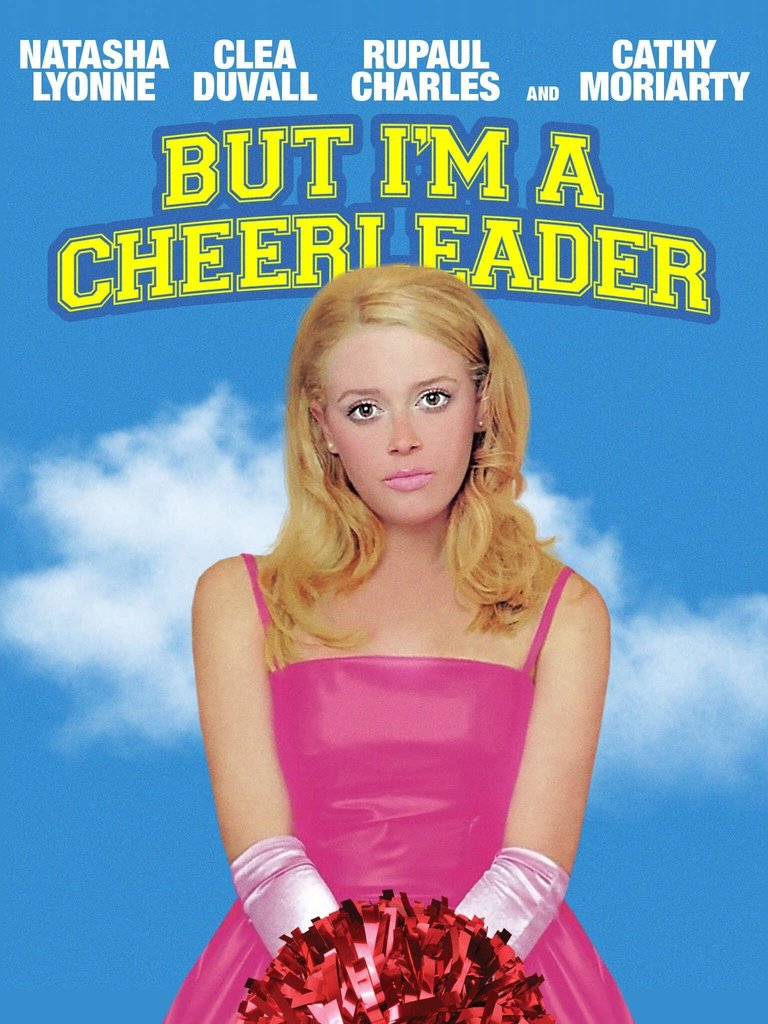
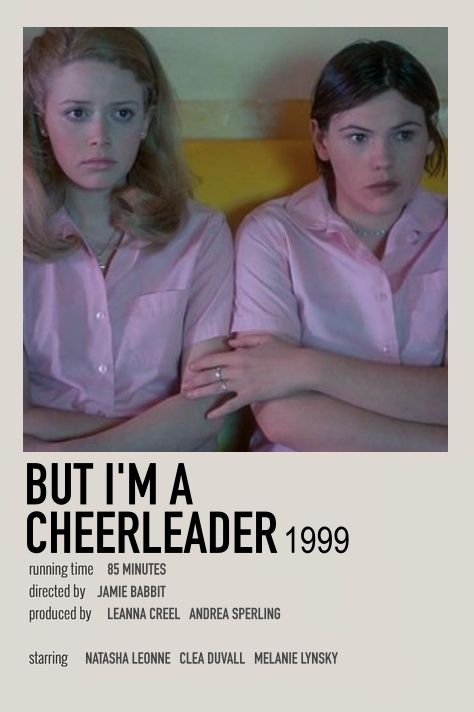
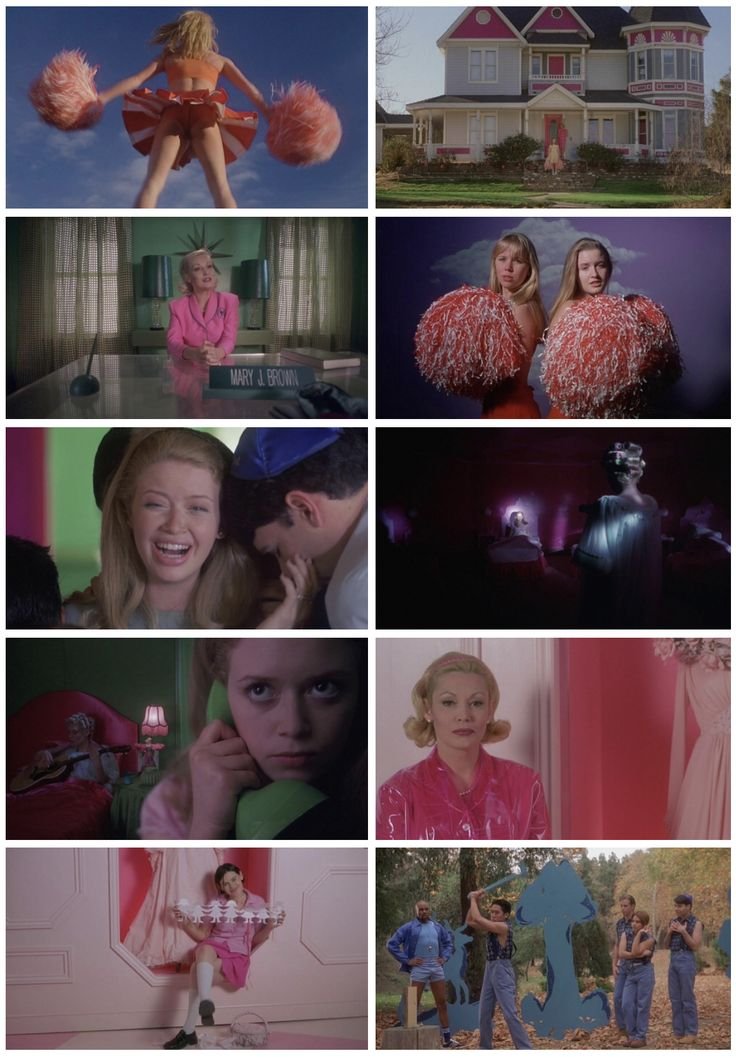
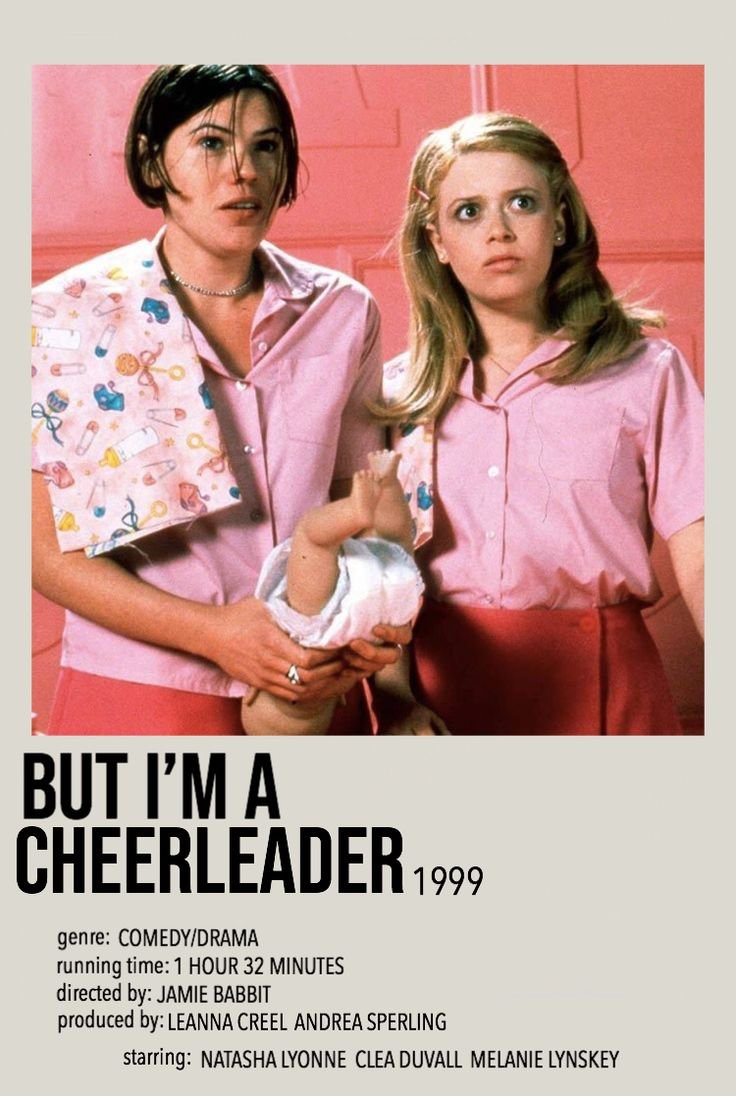
Hola, no he visto la película pero tú reseña está tan bien escrita que llamo por completo mi atención la historia de esta película, que idea tan divertida por así decirlo de hacer de una historia de una chica popular y a la vez tener todo lo que la haría ser inalcanzable sea todo lo opuesto a lo que se va viendo durante la historia, me gustaría verla para saber que tal es, gracias por compartir tu reseña 💕
Sí, es super divertida y funciona también como la lectura de una época (los noventa) y nuestra evolución frente a ciertos tópicos. Saludos y gracias por leerme.